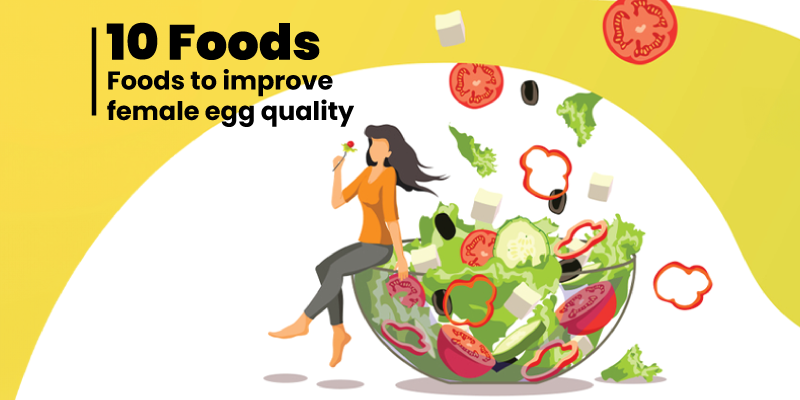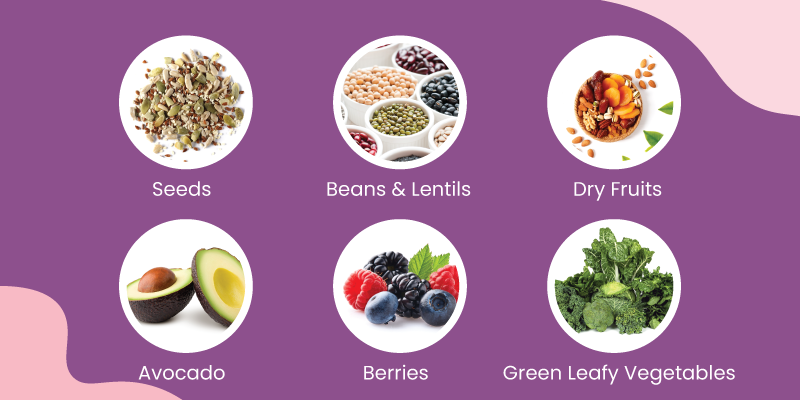10 Foods to Improve Female Egg Quality

Author: Dr. Sai Manasa Darla, Consultant, Fertility Specialist & Laparoscopic Surgeon
The ovum or egg quality is one of the important markers of female fertility. Consistent period cycles and the fertilization process or the ability to conceive depend on the quality of the egg.
But first, what is egg quality?
The term “egg quality” describes whether an egg or ovum is genetically normal or abnormal.
A good quality egg or a genetically normal ovum has 23 chromosomes (euploid). A chromosomally abnormal egg has less or more than 23 chromosomes (aneuploidy), this leads to poor egg quality and the development of genetic conditions upon fertilization.
What are the signs of good egg quality?
– Balanced hormonal levels
– Regular menstrual cycles
– Changes in the cervical fluid, basal body temperature during the menstrual cycle
What are the signs of poor egg quality?
Signs of poor egg quality are associated with increasing age. As a woman ages, a greater proportion of eggs in the ovaries tend to develop genetic defects.
-Difficulty in getting pregnant or repeated miscarriages
-Short or altered menstrual cycles
– Heavy menstrual flow
– Hormonal imbalance – Low levels of Progesterone and Anti Mullerian hormone
How to increase eggs in the ovary?
Women are born with an entire supply of eggs that are going to last her lifetime. These eggs are not fully developed and matured until the female reaches puberty. Hence, it is not possible to increase eggs in the ovary. However, the egg quality can be improved with a healthier lifestyle approach.
How can egg quality be increased?
Even though the number of eggs cannot be increased, it is possible to improve the quality of the eggs for better chances of conception. Here are a few tips that you can follow to improve the quality of eggs when trying to get pregnant or planning for IVF.
-
Maintain a healthy sleep cycle
Proper rest is essential for the body to heal and to function at a full metabolic level while awake. It is recommended to get at least 7 to 8 hours of sleep daily.
-
Stress Management
Hormones like Prolactin and Cortisol are triggered due to stress. These hormones interfere with the ovulation process. Stress-relieving methods such as meditation, yoga, exercise, or any hobby that might help you release the built-up tension can help.
-
Boosting blood flow to the ovaries
Oxygen-rich blood nourishes the ovaries to maintain good egg health. Regular yoga and exercise can help in boosting the blood flow.
-
Freezing eggs
Egg preservation is a good alternative for women who don’t have any pregnancy plans shortly. Preserving eggs by freezing them at low temperatures helps in preserving the egg quality. Egg Freezing is a good option, that women should consider at the young age of 25, as their egg quality is at its peak, and freezing good quality eggs might give a better chance at IVF success when they plan for a baby.
-
Eat healthy
Making healthy food choices not only improves reproductive health but also contributes to improving overall health.
Does food impact egg quality?
Nutrition plays an important role when it comes to women’s reproductive health. The food we consume might not have a direct link but a good balanced meal supports in improving the egg quality and reproductive potential in women by maintaining hormone levels and blood circulation.

Top 10 foods to improve egg quality
1. Beans and lentils:
Proteins help in maintaining blood sugar levels, building and cell repair. Beans and different types of lentils are a rich source of protein, iron, vitamin B complex and magnesium.
2. Seeds:
Seeds such as sesame seeds, flax seeds, pumpkin seeds, and sunflower seeds are a combination of both micronutrients and monounsaturated. Seed cycling is a method used to address hormonal imbalance.
3. Nuts and Dry Fruits:
Nuts and dried fruits such as walnuts, almonds, peanuts, cashews, and raisins are good sources of healthy fats, minerals, antioxidants, and vitamins. Nuts such as Brazil nuts are good sources of selenium. Selenium helps to repair chromosomal damage in eggs. The antioxidants in dry fruits help in lowering the oxidation stress in cells.
4. Avocados:
Avocados are super foods packed with nutrients and healthy fats. Avocados are a great source of monounsaturated fats, which support healthy reproduction and enhance the quality of eggs.
5. Berries:
Berries like strawberries, raspberries, cranberries, and blueberries are antioxidant powerhouses. They are loaded sources of antioxidants, vitamin C, and Folate. The antioxidants present in them protect the eggs from oxidative stress.
6. Cinnamon:
It is another superfood, especially for women who are suffering with PCOS. Adding cinnamon to your diet helps fight insulin resistance and enhances ovarian function.
7. Ginger:
Ginger’s anti-inflammatory property along with improving digestion and blood circulation helps in regulating periods and lowering inflammation in the reproductive system.
8. Green Leafy Vegetables:
Vitamins A, B, C, and E, iron, and calcium are a few vital nutrients that are necessary to maintain the health of eggs. Leafy vegetables such as spinach, broccoli, house these essential nutrients.
9. Whole Grains:
Whole grains are underrated hidden treasures of fibre. Fibre is a multifunctional nutrient that helps to maintain a healthy body weight by preventing rapid blood sugar spikes and stabilizing blood sugar levels. This helps in improving general health and reproductive health.
10. Dairy:
Dairy products such as milk and yogurt are a great way to incorporate calcium and probiotics into your diet.
Conclusion
Egg quality is one of the important factors that contribute to the chances of having a pregnancy and the success of the IVF procedure. It is important to understand the signs of poor and good egg quality so that you can take informed proactive solutions to improve your egg quality. Consult with a fertility specialist to figure out the different ways apart from the foods to improve egg quality.
FAQs:
1) How long does it take for dietary changes to affect egg quality?
It is important to understand that even after following the best dietary practices, changes or improvements in egg quality don’t happen overnight and the time varies among different women. Different variables such as overall health condition, and lifestyle changes also come into play.
2) Are there any foods that should be avoided when trying to improve egg quality?
Yes. Here are a few food choices you might have to reconsider when you are planning for a pregnancy and increase your chances of conception.
Caffeine, alcohol, hydrogenated fats, carbonated drinks, foods with refined sugar and flour.
Avoiding these will also help in improving the overall health.
3) Is organic produce better for improving egg quality than non-organic?
Available research indicates that the women who consumed food that was produced organically without using pesticides and other chemicals had improved their fertility, increased their chances of conceiving, and success in IVF treatment.
People Also Read:
21 Existing Ways Of Pregnancy Announcement To Husband | Understanding Seed Cycling For Period PCOS & Fertility | All You Should Know About Embryo Grading And Success Rate | Endometrial Thickness – What You Need to Know | Is It Possible To Get Pregnant With High AMH Levels










